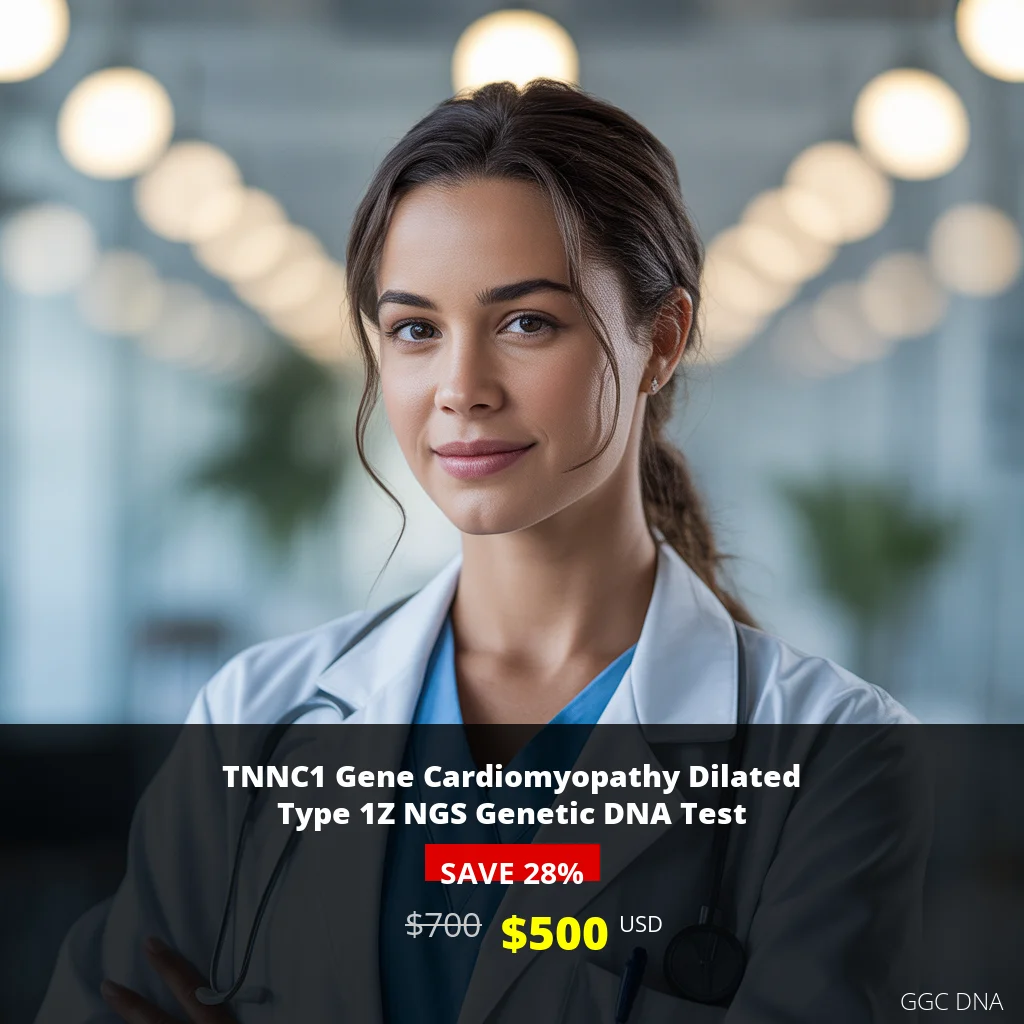TNNC1 Gene Cardiomyopathy Dilated Type 1Z NGS Genetic DNA Test
Comprehensive Introduction to TNNC1 Genetic Testing
The TNNC1 Gene Cardiomyopathy Dilated Type 1Z NGS Genetic DNA Test represents a significant advancement in cardiovascular genetic diagnostics. This specialized test focuses on identifying mutations in the TNNC1 gene, which encodes cardiac troponin C—a critical protein involved in heart muscle contraction regulation. Dilated cardiomyopathy type 1Z is an inherited cardiac condition characterized by progressive enlargement and weakening of the heart chambers, potentially leading to heart failure and life-threatening complications if left undetected.
Understanding your genetic predisposition to this condition is paramount for proactive cardiac care management. The test’s importance extends beyond individual diagnosis, providing valuable insights for family members who may be at risk and enabling comprehensive preventive healthcare strategies.
What the Test Measures and Detects
This advanced genetic analysis utilizes Next-Generation Sequencing (NGS) technology to comprehensively examine the TNNC1 gene for pathogenic variants associated with dilated cardiomyopathy type 1Z. The test specifically identifies:
- Point mutations affecting cardiac troponin C protein structure
- Deletion and insertion variants disrupting gene function
- Missense mutations altering protein conformation
- Pathogenic variants linked to inherited cardiac dysfunction
- Genetic markers predictive of cardiomyopathy progression
The NGS methodology ensures high sensitivity and specificity, detecting even rare genetic variants that conventional testing might miss. This comprehensive approach provides a complete genetic profile essential for accurate diagnosis and personalized treatment planning.
Who Should Consider This Genetic Test
Clinical Indications and Symptoms
This test is particularly recommended for individuals experiencing or concerned about:
- Unexplained shortness of breath during routine activities
- Persistent fatigue and reduced exercise tolerance
- Swelling in legs, ankles, or abdomen (edema)
- Palpitations or irregular heart rhythms
- Family history of cardiomyopathy or sudden cardiac death
- Unexplained heart failure in young family members
- Abnormal echocardiogram findings without clear cause
- Multiple family members with cardiac conditions
High-Risk Populations
- Individuals with first-degree relatives diagnosed with dilated cardiomyopathy
- Patients with unexplained left ventricular enlargement
- Young adults with family history of early-onset cardiac disease
- Individuals planning pregnancy with cardiac family history
- Athletes with family history of sudden cardiac events
Significant Benefits of TNNC1 Genetic Testing
Undergoing TNNC1 genetic testing provides numerous advantages for cardiac health management:
- Early Detection: Identify genetic predisposition before symptom onset
- Personalized Treatment: Tailor medical interventions based on genetic profile
- Family Screening: Enable proactive testing for at-risk relatives
- Reproductive Planning: Inform family planning decisions
- Preventive Care: Implement lifestyle modifications and monitoring
- Peace of Mind: Reduce uncertainty about inherited cardiac risks
- Clinical Guidance: Support cardiologists in treatment decision-making
Understanding Your Test Results
Interpretation Guidelines
Your genetic test results will fall into one of several categories, each with specific implications:
- Positive Result: Indicates presence of a pathogenic TNNC1 variant associated with dilated cardiomyopathy. Requires consultation with a cardiologist and genetic counselor for comprehensive management planning.
- Negative Result: No pathogenic variants detected in the TNNC1 gene. However, continued cardiac monitoring may still be recommended based on clinical presentation.
- Variant of Uncertain Significance (VUS): Identifies genetic changes with unclear clinical impact. Regular follow-up and family studies may be recommended.
- Benign Variants: Common genetic variations not associated with disease risk.
Post-Test Recommendations
- Schedule follow-up consultation with your cardiologist
- Consider genetic counseling for family implications
- Implement recommended cardiac monitoring protocols
- Share results with relevant healthcare providers
- Discuss family screening options with relatives
Test Pricing and Availability
| Test Component | Price (USD) |
|---|---|
| TNNC1 Gene Cardiomyopathy Dilated Type 1Z NGS Genetic DNA Test | $700 (Regular Price) |
| Special Discount Price | $500 |
Test Specifications
- Turnaround Time: 3 to 4 Weeks
- Sample Type: Blood, Extracted DNA, or One Drop Blood on FTA Card
- Methodology: Next-Generation Sequencing (NGS) Technology
- Specialty: Cardiology and Genetics
- Department: Genetic Diagnostics
- Disease Category: Cardiovascular Disorders
Nationwide Testing Availability
GGC DNA maintains comprehensive testing facilities across the United States, ensuring accessible genetic services in all major metropolitan areas including New York, Los Angeles, Chicago, Houston, Phoenix, Philadelphia, San Antonio, San Diego, Dallas, and San Jose. Our network of certified genetic counselors and cardiology specialists provides integrated care coordination for optimal patient outcomes.
Pre-Test Preparation Requirements
To ensure accurate testing and comprehensive care, we require:
- Complete clinical history documentation
- Genetic counseling session prior to testing
- Development of detailed family pedigree chart
- Review of cardiac symptoms and family cardiac history
- Discussion of test implications and potential outcomes
Take Control of Your Cardiac Health Today
Don’t let uncertainty about inherited cardiac conditions compromise your health and peace of mind. The TNNC1 Gene Cardiomyopathy Dilated Type 1Z NGS Genetic DNA Test provides the clarity needed for informed healthcare decisions and proactive cardiac management.
Call or WhatsApp us now at +1(267) 388-9828 to schedule your genetic counseling session and book your test. Our genetic specialists are available to answer your questions and guide you through the testing process.
Early detection through genetic testing can significantly impact treatment outcomes and quality of life. Take the first step toward comprehensive cardiac health management by contacting GGC DNA today.







